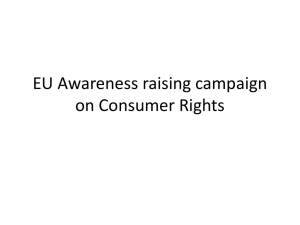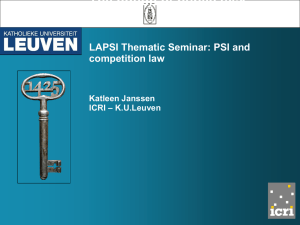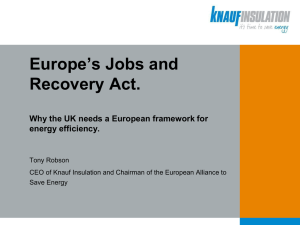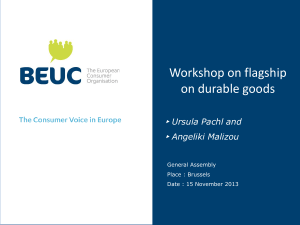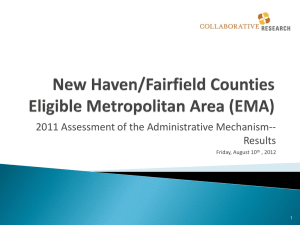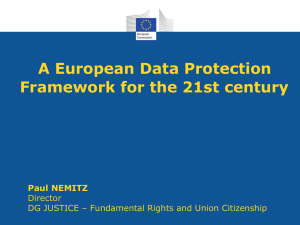Awareness Raising Campaign
advertisement
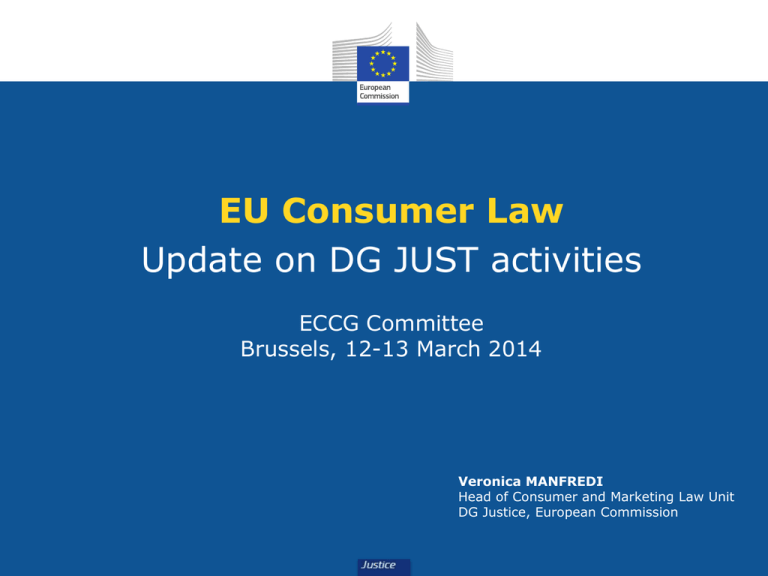
EU Consumer Law Update on DG JUST activities ECCG Committee Brussels, 12-13 March 2014 Veronica MANFREDI Head of Consumer and Marketing Law Unit DG Justice, European Commission Update on consumer files Revision of the Package Travel Directive Awareness Raising Campaign Report on the implementation of the Timeshare Directive Guidance and on-line pre-contractual information model for the Consumer Rights Directive Revision of the 2009 Guidance on application of the Unfair Commercial Practices Directive Assessment of the Legal Guarantee Revision of the Package Travel Directive Package Travel Directive (PTD) • 1990 Package Travel Directive, provides consumers with important rights: 1. 2. 3. (1) pre-contractual information rights, (2) liability of the package travel organiser (tour operator) for the performance of the package (3) the right to repatriation or a refund if the organiser (or retailer) becomes insolvent. Case for revising the PTD • Market developments: Increasingly consumers customise their holidays online with the help of different operators, including online travel agents, airline or other transport service providers. Fewer and fewer travellers are protected by the Package Travel Directive Commission proposal on 9 July 2013 Main aspects of the Commission proposal The proposal aims to extend the protection to (online) customised combinations similar to packages Example: Different travel components selected from an online travel agent and charged at an inclusive price Less protection for looser combinations of travel services, "assisted/linked travel arrangements". (Invitations to book additional travel services (e.g. a hotel room or car rental) from a linked website) State of play Reactions to the Proposal show a consensus that the current rules have to be modernised. Negotiations under the LT Presidency covered half of the provision. Many MS have not yet fully defined their position Things are moving faster in the EP: The lead committee, IMCO, voted the report by Hans-Peter Mayer (IMCO, EPP-DE) on 11 February. On the basis of the current planning, the EP aims to adopt its position on 12 March 2014. State of play (cont) Main aspects of the Mayer report as voted in IMCO: Full harmonisation in principle (using same provision as in CRD) Minimum harmonisation for the rules on liability, allowing MS to make the retailer liable in addition to the organiser Scope of linked travel arrangements (LTA) narrowed - only transfer of personal data will trigger a LTA Price changes: 3 % absorbed by organiser, 8 % right to terminate The Awareness Raising Campaign Awareness Raising Campaign Consumer Rights only effectively exist IF: consumers know their rights consumers know how to enforce their rights traders know and respect consumers' rights BUT: According to Eurobarometers 331 and 332, just around 40% of consumers and traders know exactly the length of product guarantee and only roughly 30% know exactly the length of cooling-off period for online purchases Awareness Raising Campaign: Aims better awareness of the rights and obligations of consumers and traders • mostly from national transposition of EU directives • focus on Consumer Rights Directive, Unfair Commercial Practices Directive; Unfair Contract Terms Directive; Consumer Sales and Guarantees Directive maximise the opportunities of close cooperation with all stakeholders, in particular • relevant national authorities • consumer associations • business associations • ECCs Awareness Raising Campaign: Content "USE your consumer rights" You have the right to truthful advertising You have the right to have defective goods repaired or replaced You have the right to contracts without unfair clauses You have the right to return goods purchased online within 14 days You have the right to free assistance by European Consumer Centres "Respect your consumers' rights" Your customers will come back for more Awareness Raising Campaign: Scope "Multiplier campaign" March – December 2014 Bulgaria, Cyprus, Greece, Italy, Latvia, Poland, Portugal, Spain facilitated by an external service provider may be extended, both in time and geographical scope Awareness Raising Campaign: Posters Awareness Raising Campaign: Posters Awareness Raising Campaign: Posters Awareness Raising Campaign: leaflet in A6 (credit-card format in preparation) Report on the application of the Timeshare Directive Directive 2008/122/EC (Timeshare) Directive was to be transposed by February 2011; due to delays fully transposed in the EU in March 2012 Complete transposition check carried out in 2013; a number of EU Pilot procedures were launched as a result Several Member States have already agreed to adjusting certain aspects of their national transposition laws Directive 2008/122/EC (Timeshare) Report on the application due in 2014 Research on the practical application of the Directive by the Centre for Strategy & Evaluation Services (CSES, December 2013 to May 2014) It includes a series of interviews with stakeholders; the input and assistance of consumer organisations is very valuable and appreciated Study on Timeshare Directive Focus: practical implementation of the Timeshare Directive; in particular, the respect for and the impact of the provisions on: Pre-contractual information; Right of withdrawal and ban on advance payments; Staggered payment procedure for Long Term Holiday Products (such as discount holiday clubs). Also: issues outside the scope of the Directive but of strong relevance for the existing timeshare owners, such as: New commercial practices and types of fraud ("reclaim" services, fake offers to represent owners in disputes with sellers etc.) Any undue restrictions on the owners' rights regarding, e.g., private sale, renting, exchange of their timeshare Termination of long-term contracts, access to services, unfair contract terms regarding management / annual fees etc. The Consumer Rights Directive Directive 2011/83/EU (the CRD) Transposition deadline – 13 December 2013 Several meetings with Member States in 2012 – 2013 to assist them in the transposition process So far notification of transposition by 14 Member States; infringement procedures opened regarding those who are late Transposition measures to apply to contracts concluded as from 13 June 2014 Guidance being prepared to facilitate uniform application across the EU, including voluntary model for the online display of consumer information for digital products First presentation of the model to Member States and stakeholders at the WS on 11 December 2013 References to national transposition measures in EUR-Lex CRD regulatory choices (Article 29) – information to stakeholders http://ec.europa.eu/justice/consumer-marketing/rights-contracts/ CRD Guidance – sample issues to be addressed Exceptions of various types of contracts from the scope of application (Article 3) Definition of "Off-premises contracts" that are of wider scope than contracts covered by the replaced Doorstep Selling Directive 85/577/ECC (Article 2) Pre-contractual information requirements (Articles 5,6 & 8) Fees for the use of means of payment (Article 19) After-sales telephone contacts (Article 21) The right of withdrawal (Articles 9-16) Online Digital products and the Model for the online display of key information Pre-contractual information Legal bases for pre-contractual information obligations for online digital products: Article 8(2) main characteristics (Article 6(1)(a)) total price (Article 6(1)(e)) duration of the contract & the conditions for terminating the contract (Article 6(1)(o)), including minimum duration of the contract, where applicable (Article 6(1)(p)) Article 8(4) + identity of the trader (Article 6(1)(b)) + conditions for withdrawal (Article 6(1)(h)) 28 The Model for the online display of key information on online digital products Principles Collaborative: stakeholders are called to contribute to the development of the model Optional: traders are invited to use it, but it is not a legal obligation Flexible: must be adaptable to the presentational aspects of the traders' website or sales channel, and to the requirements of the different products Graphical: icons and a table-like presentation will facilitate comprehension, especially for inexperienced consumers of online digital content Short: only information and icons that apply to the product should be displayed 29 30 31 The Model for the online display of key information on online digital products 32 Revision of the 2009 Guidance on the application of the Unfair Commercial Practices Directive Revision of the UCPD Guidance Announced in the 2012 Consumer Agenda and in the UCPD Communication and Report of 14 March 2014 Preparatory work • Thematic workshops with enforcers • Bilateral meetings with selected MS • Involvement of stakeholders Foreseen for adoption in October 2014 Indicative list of issues for the Guidance New advertising techniques including on Social Media (targeting, profiling – dynamic pricing - interplay with data protection) Customer Review tools, Price Comparison web-sites and "Group Buying" Pricing issues in travel sector (interplay with the Air Services Reg. and the CRD) Marketing of commercial warranties Environmental claims Immovable property (clarification of the notions of transactional decision, average consumer and material information) Interaction between the UCPD and sector-specific legislation The Consumer Sales and Guarantees Directive Directive 1999/44/EC The legal guarantee – consumer problems About 10% of the 32 000 complaints related to crossborder purchases and received by ECCs in 2012 were related to the legal guarantee. 26 enquiries about the legal guarantee were received by Your Europe Advice service of the Commission in 2013. 39 mutual assistance requests concerning Directive 1999/44/EC were filed in the Consumer Protection Cooperation system for 2007-2010 but there were many more related to misleading advertising of guarantees. The legal guarantee – identified issues Misleading advertising of guarantees, e.g. related to the relation between the commercial and the legal guarantee. How to prove after 6 months that the lack of conformity existed at the time of delivery? Problems with the choice of remedies, e.g. when the consumer has the right to have the contract rescinded or the price reduced. Application of the legal guarantee to digital content products by national courts on a case-by-case basis. Lack of traders' awareness that there is a compulsory 2year guarantee. The legal guarantee – next steps The Commission will launch a consumer market study in 2014 on consumer legal guarantees to evaluate amongst others the difficulty for consumers to claim their rights. The outcomes of this study will feed into the evaluation, announced by the recent "REFIT" Communication, of the EU consumer acquis in terms of its regulatory fitness and in order to explore the simplification potential. Thank you for your attention Comments: just-notifications-A3@ec.europa.eu
